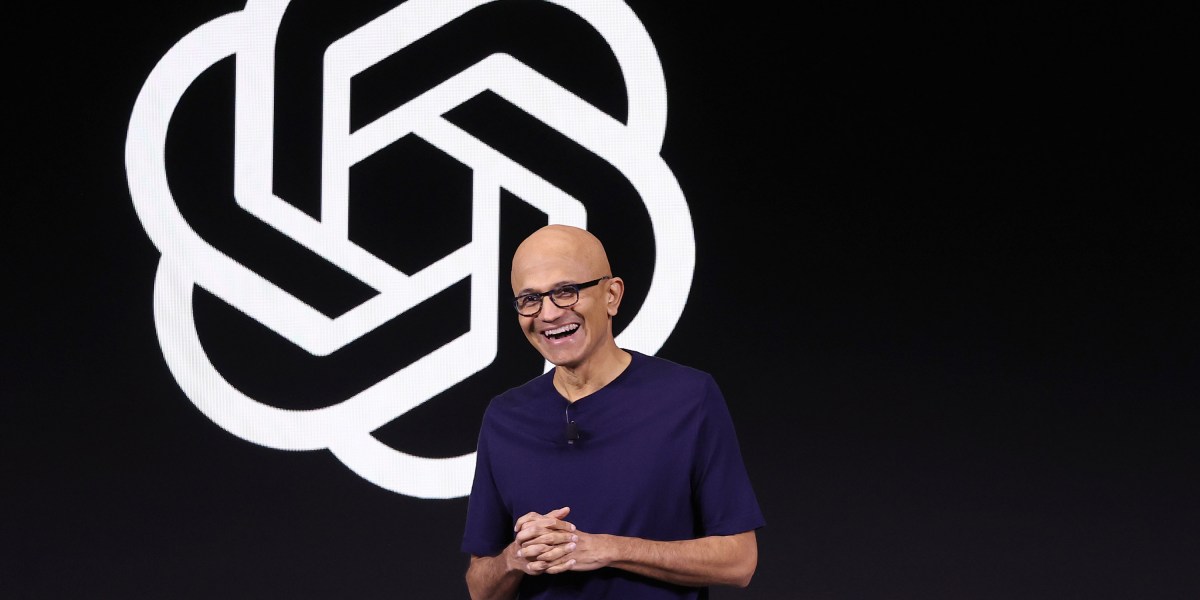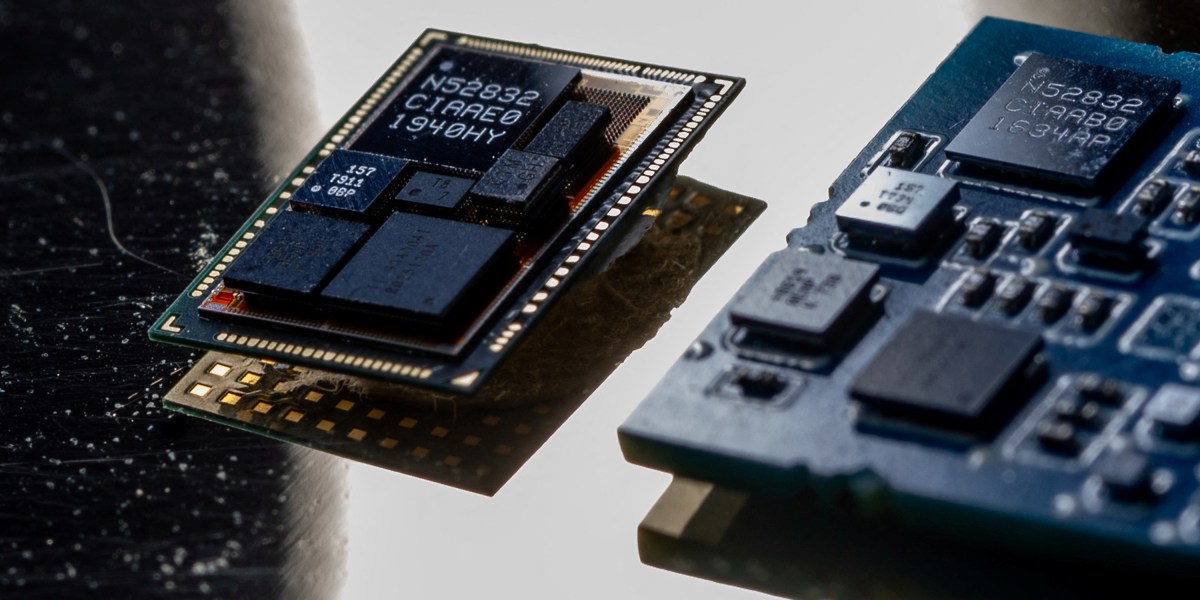The Download: Big Tech’s AI stranglehold, and gene-editing treatments
This is today’s edition of The Download, our weekday newsletter that provides a daily dose of what’s going on in the world of technology.
Make no mistake—AI is owned by Big Tech
—By Amba Kak, Sarah Myers West and Meredith Whittaker, members of the AI Now Institute
Until late November, when the epic saga of OpenAI’s board breakdown unfolded, the casual observer could be forgiven for assuming that the ecosystem around generative AI was vibrant and competitive.
But this is not the case—nor has it ever been. And understanding why is fundamental to understanding what AI is, and what threats it poses. Put simply, in the context of the current paradigm of building larger- and larger-scale AI systems, there is no AI without Big Tech.
With vanishingly few exceptions, every startup, new entrant, and even AI research lab is dependent on these firms. Those with the money make the rules. And right now, they’re engaged in a race to the bottom, releasing systems before they’re ready in an attempt to retain their dominance. Read the full story.
I received the new gene-editing drug for sickle cell disease. It changed my life.
—By Jimi Olaghere, a patient advocate and tech entrepreneur
One day a few years ago, I received a package that would change my life. It was from Vertex Pharmaceuticals, and it contained a consent form to participate in a clinical trial for a new gene-editing drug to treat sickle cell disease.
I’d lived with sickle cell my whole life—experiencing chronic pain, organ damage, and hopelessness. To me, this opportunity meant finally taking control of my life.
The drug I received, called exa-cel, could soon become the first CRISPR-based treatment to win approval from the US Food and Drug Administration. But many people who need these treatments may never receive them. Read the full story.
Fossil-fuel emissions are over a million times greater than carbon removal efforts
Carbon dioxide emissions from fossil fuels are on track to reach a record high by the end of 2023. And a new report shows just how insignificant technologies that pull greenhouse gases out of the atmosphere are by comparison.
Emissions are projected to reach 36.8 billion metric tons in 2023, a 1.1% increase from 2022 levels, according to this year’s Global Carbon Budget Report. And it also found that one technology that’s sometimes touted as a cure-all for the emissions problems has severe limitations: carbon dioxide removal. Read the full story.
—Casey Crownhart
AI’s carbon footprint is bigger than you think
World leaders are currently in Dubai for the UN COP28 climate talks. But there’s one thing people aren’t talking enough about, and that’s the carbon footprint of AI.
One part of the reason is that big tech companies don’t share the carbon footprint of training and using their massive models, and we don’t have standardized ways of measuring the emissions AI is responsible for. That is, until now. Read the full story.
—Melissa Heikkilä
This story is from The Algorithm, our weekly newsletter giving you the inside track on all things AI. Sign up to receive it in your inbox every Monday.
The must-reads
I’ve combed the internet to find you today’s most fun/important/scary/fascinating stories about technology.
1 America isn’t ready for future wars
As conflict becomes increasingly AI-powered, red tape is getting in the way. (Axios)
+ The internet is the new frontier of warfare. (Motherboard)+ Inside the messy ethics of making war with machines. (MIT Technology Review)
2 It’s a rocky time for renewable energy
Its costs are soaring, and the industry is in trouble. (Economist $)
+ Yes, we have enough materials to power the world with renewable energy. (MIT Technology Review)
3 We’re waiting for all those robot trucks we were promised
But companies are understandably nervous about automating massive rigs. (The Verge)
+ Cruise has been accused of withholding key details about its robotaxi accident. (TechCrunch)
4 IBM says it’s hit a quantum computing research milestone
The two new systems should be able to execute the most powerful quantum algorithms to date. (Ars Technica)
+ Though it appears to have made little progress on finding commercial uses for the technology. (FT $)
5 Internet censorship in US schools is a growing problem
And it’s preventing kids from finding out crucial info about their health, identity, and the subjects they’re studying. (Wired $)
+ AI is about to make spying a whole lot easier. (Slate $)
+ The book ban movement has a chilling new tactic: harassing teachers on social media. (MIT Technology Review)
6 Brain implants are helping people recover from traumatic injuries
The implants appear to help them regain the ability to focus. (NYT $)
+ A brain implant changed her life. Then it was removed against her will. (MIT Technology Review)
7 There’s little data to prove that video doorbells deter crime
That doesn’t prevent their makers from marketing them as successful preventatives, though. (Undark)
+ How Amazon Ring uses domestic violence to market doorbell cameras. (MIT Technology Review)
8 China is building its first underwater data center
Well, that’s one way of keeping computers sufficiently cool. (New Scientist $)
9 It’s nearly time to make drugs in space 

The reality is much closer than you think. (Bloomberg $)
+ Meet the team who discovered an entirely new planet. (The Atlantic $)
10 Please don’t make me go to the branded metaverse
Nothing good ever happens there. Nothing. (The Guardian)
Quote of the day
“I’d rather see you eating the sandwich, than have your camera off.”
—Diane Gottsman, who runs a professional etiquette training company, explains why it’s so important to look like you’re paying attention during video meetings to the Washington Post.
The big story
How to spot AI-generated text
December 2022
This sentence was written by an AI—or was it? OpenAI’s chatbot, ChatGPT, presents us with a problem: How will we know whether what we read online is written by a human or a machine?
Since it was released in November 2022, ChatGPT has been used by millions of people. It has the AI community enthralled, and it is clear the internet is increasingly being flooded with AI-generated text.
We’re in desperate need of ways to differentiate between human- and AI-written text in order to counter potential misuses of the technology. But while labs are racing to develop tools tasked with spotting AI-generated text, they’re not always reliable. Read the full story.
—Melissa Heikkilä
We can still have nice things
A place for comfort, fun and distraction in these weird times. (Got any ideas? Drop me a line or tweet ’em at me.)
+ How each country decides on its delicious chip (that’s crisps for Brits) flavors.
+ These long exposure shots of planes taking off are amazing.
+ Live out your very own Wolf of Wall Street fantasies—its famous trashed Lamborghini could be yours for $1.5 million.
+ Pippa the baby kangaroo is just too cute.
+ Why America’s love affair with spicy food could finally be coming to an end.




